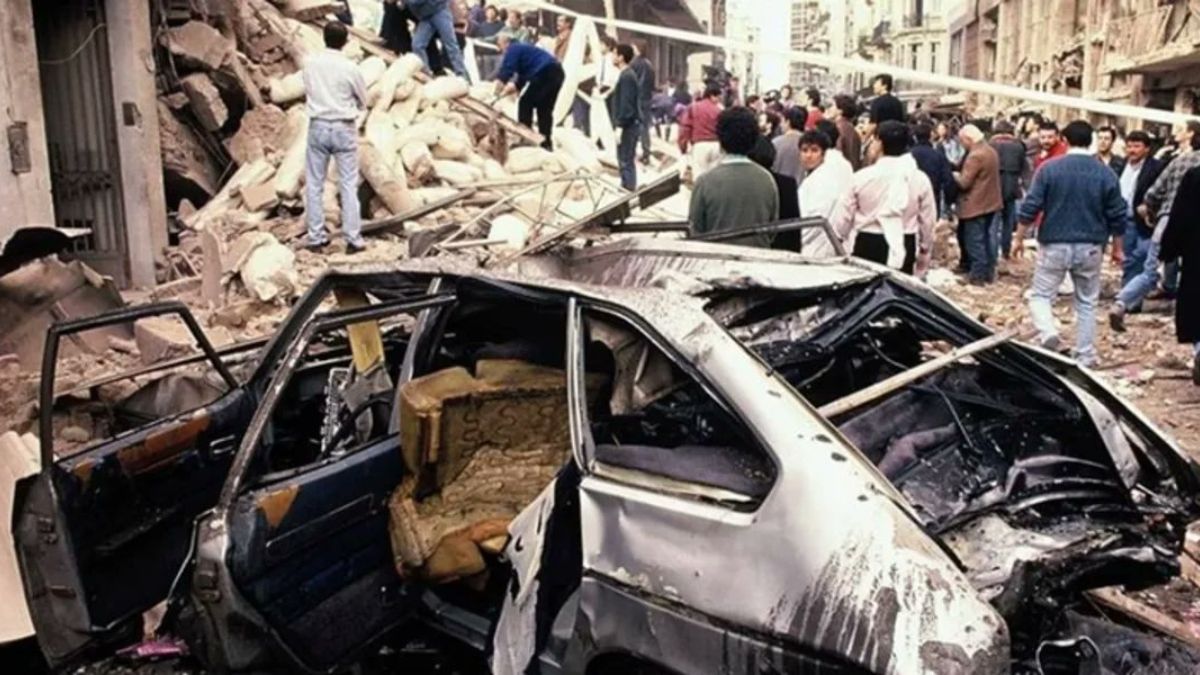Argentina orders trial of Iranians and Hezbollah members in absentia over 1994 Buenos Aires bombing
 The 1994 bombing of the Argentine Israelite Mutual Association centre in Buenos Aires that killed 84 people | X
The 1994 bombing of the Argentine Israelite Mutual Association centre in Buenos Aires that killed 84 people | X
More than three decades after a devastating bombing struck the heart of Argentina’s Jewish community, a judge has ordered the trial in absentia of 10 Iranian and Lebanese nationals suspected of orchestrating the attack. The 1994 bombing of the Argentine Israelite Mutual Association (AMIA) centre in Buenos Aires killed 85 people and injured over 300 in the deadliest terrorist attack in the country’s history.
Federal judge Daniel Rafecas ruled yesterday that the suspects, including former Iranian ministers and Hezbollah operatives, would be prosecuted despite being fugitives. Argentina has long blamed the Lebanese militant group Hezbollah for carrying out the bombing at Iran’s behest, though neither Hezbollah nor Tehran has claimed responsibility. Iran has consistently denied involvement and refused to extradite the suspects.
Rafecas described the decision as "exceptional" given the circumstances, citing the "material impossibility of securing the presence of the defendants and the nature of the crime against humanity under investigation". He said that a trial in absentia was necessary to "at least try to uncover the truth and reconstruct what happened".
The attack on July 18, 1994, involved a van loaded with explosives driven into the AMIA building. Despite extensive investigations, no one has been arrested. Argentina issued arrest warrants in 2006 for eight Iranians, including then-president Ali Akbar Hashemi Rafsanjani, who died in 2017. Among the accused still alive are former intelligence minister Ali Fallahian, Revolutionary Guard commander Mohsen Rezaei, and former foreign minister Ali Akbar Velayati, who now serves as a senior adviser to Iran’s supreme leader.
Three Lebanese nationals are also to be tried, including Salman Raouf Salman, alleged to have coordinated the bombing, along with Hezbollah members Abdallah Salman and Hussein Mounir Mouzannar. All ten have been declared in contempt of court and remain at large.
Until earlier this year, Argentine law required defendants to be physically present for a criminal trial. But President Javier Milei, who has made the AMIA case a cornerstone of his foreign policy agenda, pushed legislation through Congress to allow trials in absentia. The move followed a ruling in April 2024 in which an Argentine court formally blamed Hezbollah for the bombing, calling it a “crime against humanity”. The court said the attack and an earlier bombing of the Israeli embassy in 1992 were likely retaliation for Argentina cancelling nuclear technology deals with Iran under former president Carlos Menem.
Despite pointing to motive, the court did not provide definitive evidence of Iranian involvement. Nonetheless, the attack has continued to cast a long shadow over Argentine politics and its judicial system. A separate 2019 trial exposed the scale of the cover-up that followed the bombing, convicting former judge Juan José Galeano, former intelligence chief Hugo Anzorreguy and two prosecutors of manipulating the investigation to falsely implicate local police officers while ignoring leads involving Iran and Syria.
The case also engulfed former president Cristina Fernández de Kirchner, who in 2013 signed a memorandum with Iran to allow Argentine prosecutors to question suspects in Tehran. The pact was annulled amid widespread condemnation. Prosecutor Alberto Nisman accused Fernández of seeking to shield Iranian officials in exchange for favourable trade deals. Days after making the allegation in 2015, Nisman was found dead in his apartment under suspicious circumstances. In 2024, Argentina’s Supreme Court ordered Fernández to stand trial over the memorandum.
The Inter-American Court of Human Rights last year condemned the Argentine state for failing to prevent the attack and for undermining the investigation, accusing officials of “cover-up and obstruction”.
Despite years of frustration and diplomatic dead ends, President Milei has vowed to pursue justice. During a visit to Jerusalem earlier this month, he reaffirmed his support for Israel and intensified his criticism of Iran, calling it “an enemy of Argentina”.
For the victims’ families and the broader Jewish community in Argentina, the trial marks a long-awaited step forward. As Judge Rafecas concluded in his ruling, “No matter how much time has passed, justice must not be paralysed by impunity.”
Middle East